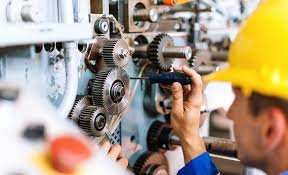
Enhancing Equipment Reliability Through Effective Mechanical Maintenance Practices
The Importance of Mechanical Maintenance in Ensuring Equipment Reliability
Effective mechanical maintenance is crucial for ensuring the reliability and longevity of equipment in various industries. Whether it’s heavy machinery in manufacturing plants or HVAC systems in commercial buildings, regular maintenance practices play a key role in preventing breakdowns, reducing downtime, and ultimately saving costs.
One of the primary benefits of mechanical maintenance is the early detection of potential issues. By conducting routine inspections, lubrication, and adjustments, maintenance technicians can identify worn-out components or signs of malfunction before they escalate into major problems. This proactive approach not only prevents unexpected breakdowns but also extends the service life of equipment.
Moreover, regular maintenance helps to optimise equipment performance. Well-maintained machinery operates more efficiently, consumes less energy, and produces higher-quality output. This leads to increased productivity and reduced operational costs over time.
Another important aspect of mechanical maintenance is safety. Faulty equipment poses serious risks to both workers and the surrounding environment. By adhering to a comprehensive maintenance schedule that includes safety checks and compliance with regulations, organisations can create a safer work environment for their employees.
In conclusion, mechanical maintenance is an essential practice for businesses looking to maximise the reliability and performance of their equipment. By investing in regular upkeep and timely repairs, companies can avoid costly downtime, improve efficiency, enhance safety standards, and ultimately achieve long-term success.
Essential Tips for Effective Mechanical Maintenance
- Regularly check and change engine oil as per manufacturer’s recommendations.
- Inspect and replace air filters to ensure proper airflow.
- Check tyre pressure regularly and rotate tyres as recommended.
- Inspect brake pads and replace them if worn out to maintain braking efficiency.
- Keep the cooling system in good condition by checking coolant levels and flushing the system when needed.
- Regularly inspect belts and hoses for signs of wear and tear, replacing them as necessary.
- Ensure timely servicing of the vehicle according to the maintenance schedule provided by the manufacturer.
Regularly check and change engine oil as per manufacturer’s recommendations.
Regularly checking and changing the engine oil in accordance with the manufacturer’s recommendations is a critical aspect of mechanical maintenance for any vehicle or machinery. Engine oil plays a vital role in lubricating moving parts, reducing friction, and dissipating heat, which helps to prolong the engine’s lifespan and maintain optimal performance. By following the prescribed oil change intervals, users can ensure that their equipment operates smoothly, prevents unnecessary wear and tear, and ultimately avoids costly repairs in the long run.
Inspect and replace air filters to ensure proper airflow.
Inspecting and replacing air filters is a crucial tip in mechanical maintenance to ensure proper airflow within equipment. Clogged or dirty air filters can restrict airflow, leading to inefficient operation and potential damage to the system. By regularly checking and replacing air filters as needed, maintenance technicians can maintain optimal airflow, improve equipment performance, and extend the lifespan of the machinery. This simple yet effective practice not only enhances efficiency but also contributes to overall equipment reliability and longevity.
Check tyre pressure regularly and rotate tyres as recommended.
Regularly checking tyre pressure and rotating tyres as recommended are essential practices in mechanical maintenance for vehicles. Proper tyre pressure not only ensures optimal fuel efficiency but also enhances vehicle handling and safety on the road. By maintaining the correct tyre pressure, drivers can prolong the lifespan of their tyres and prevent uneven wear. Additionally, rotating tyres at recommended intervals helps distribute wear more evenly among all tyres, extending their longevity and improving overall performance. By incorporating these simple yet crucial maintenance tasks into their routine, vehicle owners can promote safety, save on fuel costs, and maximise the durability of their tyres.
Inspect brake pads and replace them if worn out to maintain braking efficiency.
To ensure optimal braking efficiency and safety, it is crucial to regularly inspect brake pads for wear and tear. If brake pads are worn out, they should be promptly replaced. By staying proactive in monitoring and replacing worn brake pads, you can maintain the effectiveness of your braking system, reduce the risk of potential accidents, and prolong the lifespan of your vehicle’s components.
Keep the cooling system in good condition by checking coolant levels and flushing the system when needed.
To ensure optimal performance and longevity of your equipment, it is crucial to maintain the cooling system in good condition. Regularly checking coolant levels and flushing the system when necessary helps prevent overheating and potential damage to critical components. By keeping the cooling system well-maintained, you can enhance the efficiency of your machinery and reduce the risk of costly breakdowns. Prioritising this aspect of mechanical maintenance contributes to the overall reliability and functionality of your equipment.
Regularly inspect belts and hoses for signs of wear and tear, replacing them as necessary.
Regularly inspecting belts and hoses for signs of wear and tear is a crucial tip in mechanical maintenance. These components play a vital role in the proper functioning of machinery and equipment, and any damage or deterioration can lead to costly breakdowns. By conducting routine inspections and replacing worn-out belts and hoses as needed, businesses can prevent unexpected failures, ensure smooth operations, and prolong the lifespan of their equipment. This proactive approach to maintenance helps maintain efficiency, reduce downtime, and ultimately save on repair costs in the long run.
Ensure timely servicing of the vehicle according to the maintenance schedule provided by the manufacturer.
Ensuring timely servicing of the vehicle in accordance with the maintenance schedule provided by the manufacturer is crucial for maintaining its optimal performance and longevity. Following the manufacturer’s recommended service intervals helps to address potential issues before they escalate, ensuring that the vehicle operates smoothly and efficiently. By adhering to the prescribed maintenance schedule, one can prevent unexpected breakdowns, extend the lifespan of critical components, and ultimately save on costly repairs in the long run.
